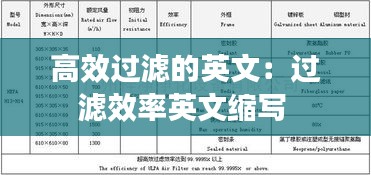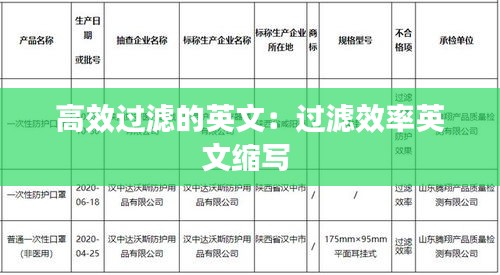Introduction to Efficient Filtration
Efficient filtration is a critical process in various industries, from water treatment to air purification and beyond. It involves the removal of impurities, contaminants, and unwanted particles from fluids to ensure they meet specific quality standards. This article delves into the concept of efficient filtration, its importance, and the technologies used to achieve it.
What is Efficient Filtration?
Efficient filtration refers to the process of separating solid particles from a liquid or gas by means of a filter medium. This medium can be a physical barrier, such as a mesh or a membrane, or a chemical agent that attracts and traps particles. The efficiency of a filtration system is determined by its ability to remove particles of a certain size and the rate at which it can process the fluid without clogging or reducing flow rates.
Importance of Efficient Filtration
Efficient filtration is crucial for several reasons:
Public Health: In water treatment, efficient filtration ensures that drinking water is safe from pathogens and contaminants, preventing waterborne diseases.
Environmental Protection: By removing pollutants from industrial effluents, filtration helps reduce environmental impact and comply with regulatory standards.
Product Quality: In manufacturing processes, efficient filtration can improve the quality of products by removing impurities that could affect their performance or shelf life.
Energy Efficiency: By maintaining consistent flow rates and preventing clogs, efficient filtration systems can reduce energy consumption.
Types of Filtration Systems
There are several types of filtration systems, each designed for specific applications:
Sediment Filtration: This involves the removal of large particles, such as sand and silt, from water. It is often the first step in a multi-stage filtration process.
Cartridge Filtration: Cartridges are used to remove finer particles, typically in the range of 0.5 to 50 micrometers. They are commonly used in water purification systems and HVAC applications.
Membrane Filtration: This method uses a semi-permeable membrane to separate particles based on their size. It includes ultrafiltration, nanofiltration, and reverse osmosis, each with varying degrees of particle removal.
Adsorption Filtration: This process involves the use of adsorbent materials, such as activated carbon, to remove impurities by attracting and holding them on the surface of the material.
Electrostatic Filtration: Utilizing electrostatic forces, this method attracts and traps particles based on their charge, making it effective for removing sub-micron particles.
Challenges in Efficient Filtration
While efficient filtration is essential, it also presents several challenges:
Clogging: Over time, filters can become clogged with particles, reducing flow rates and requiring more frequent maintenance.
Particle Retention: Filters must be designed to retain particles of a specific size while allowing the fluid to pass through at an acceptable rate.
Cost: High-quality filtration systems can be expensive to purchase and maintain, especially for large-scale applications.
Regulatory Compliance: Filtration systems must meet specific regulatory standards to ensure the safety and quality of the filtered product.
Technological Advancements in Filtration
Advancements in technology have led to the development of more efficient and cost-effective filtration systems:
Smart Filters: These filters incorporate sensors to monitor flow rates and particle counts, alerting operators to maintenance needs.
Self-Cleaning Filters: Some filters are designed to automatically remove particles from their surface, extending their lifespan and reducing downtime.
Composite Membranes: New materials for membranes have been developed to improve particle retention and reduce energy consumption.
Microbial Filters: These filters use biological processes to remove contaminants, offering a more sustainable and eco-friendly solution.
Conclusion
Efficient filtration is a vital process that plays a significant role in maintaining public health, environmental quality, and product integrity. As technology continues to advance, the efficiency and
转载请注明来自广州贝贝鲜花礼品网,本文标题:《高效过滤的英文:过滤效率英文缩写 》











 蜀ICP备2022005971号-1
蜀ICP备2022005971号-1
还没有评论,来说两句吧...